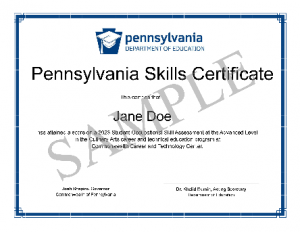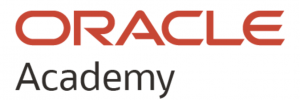 In a world where competition for jobs, pay increases, and academic success continues to increase, certifications offer hope because they are a credible, third-party assessment of a candidate’s skill and knowledge for a given subject. To empower learners with these credentials to succeed, school districts across Illinois partnered with Certiport, helping bring industry-recognized certifications to schools and learners in their communities. Discover how this impacted students and employers in their respective areas.
In a world where competition for jobs, pay increases, and academic success continues to increase, certifications offer hope because they are a credible, third-party assessment of a candidate’s skill and knowledge for a given subject. To empower learners with these credentials to succeed, school districts across Illinois partnered with Certiport, helping bring industry-recognized certifications to schools and learners in their communities. Discover how this impacted students and employers in their respective areas.
Why certification?
Illinois’ Career Technical Education (CTE) programs are focused on preparing learners for careers in high-wage, high-skill, and in-demand occupations. Certiport’s certification programs are preparing students for prosperous careers across the state, from rural areas such as Flora, to urban destinations like Chicago.
“In Chicago Public Schools, we are placing high emphasis on teaching in the classroom that have high quality post-secondary outcomes,” said Chandler Meyer-Brown, Director of Career and Technical Education for Chicago Public Schools. “We know that teaching and certifying students has a long-term impact on student success.”
To set learners up for success, districts across Illinois leverage several certifications from the Certiport portfolio, including:
- Adobe Certified Professional certification
- Autodesk Certified User certification
- Communication Skills for Business certification
- Entrepreneurship and Small Business certification
- IC3 Digital Literacy certification
- IT Specialist certification
- Intuit certifications
- Microsoft Office Specialist certification
By selecting a diverse portfolio of certifications, Illinois educators are preparing students to enter the workforce, with doors open to multiple industries. “For many years now we’ve known that students need a variety of credentials when they want to prepare for going into the workforce. Certainly, industry certifications have become an increasingly important building block for our students’ success,” said Anne Cothran, Director of Education for Employment System of the Moraine Area Career System.
How were Certiport’s certifications implemented?
Illinois schools and career centers customized the delivery of the certifications based on their learners’ needs, leveraging Certiport’s “full pathway” resources. This means that schools not only have certifications for their learners but also curriculum and practice tests to make sure all learners are prepared for testing. Each district, school, and educator can decide which resources work best for them and their learners.
Community High School District 218 decided on a pilot program, where educators first tested the curriculum and certifications before offering them to their learners. Each teacher then offered the certification to a handful of learners. “All nine students in the pilot program got certified,” said Frank Lamantia, Curriculum Director for CTE in Community High School District 218. “Seeing that 100% pass rate in the pilot was all the evidence we needed to move forward.”
Illinois educators and district representatives like Frank selected learning products and practice tests to prepare students for their actual certifications. “Certiport provides various resources, like CertPREP and other online teaching resources, that are so helpful for students. We want to make sure they understand what to expect on the certification exams,” said Mohammed Ikramullah, IT teacher at Mather High School.
What was the impact?
Integrating certification in Illinois schools has significantly impacted learners and communities. “Certifications allow my students to leave with something tangible that they can take into the workforce,” commented Robert Lee, a teacher in Chicago Public Schools. Learners across Illinois also shared the impact their certifications have had on their education and job opportunities.
Illinois schools are shaping futures and preparing learners with industry-recognized skills for success — using certifications to open doors and unlock possibilities that were previously unattainable.
Start empowering learners through Certiport certifications. Certiport offers an array of programs that can benefit IT, business, design, hospitality and culinary arts, health sciences, and agriscience educators. Get started today by visiting Certiport.com.
By Hannah Crepeau, Content Manager at Certiport, a Pearson VUE Business. Email questions to [email protected].
The views, opinions, services, and products shared in this post are solely for educational purposes and do not imply agreement or endorsement by Advance CTE, nor discrimination against similar brands, products, or services not mentioned.



 Career Technical Education (CTE) systems are filled with proud moments of learner achievement, from graduation ceremonies to competitions and certifications. Research consistently shows that these recognition opportunities have positive impacts, increasing knowledge and engagement in learning. At NOCTI/Nocti Business Solutions (NBS), we believe in recognizing talent across all CTE stakeholder groups, including education professionals. These professionals include teachers, administrators, work-based learning coordinators, and data professionals—roles that are important to the success of CTE systems. Let’s explore the unique certification opportunities designed specifically for CTE professionals and why they are essential for navigating the seas of career success
Career Technical Education (CTE) systems are filled with proud moments of learner achievement, from graduation ceremonies to competitions and certifications. Research consistently shows that these recognition opportunities have positive impacts, increasing knowledge and engagement in learning. At NOCTI/Nocti Business Solutions (NBS), we believe in recognizing talent across all CTE stakeholder groups, including education professionals. These professionals include teachers, administrators, work-based learning coordinators, and data professionals—roles that are important to the success of CTE systems. Let’s explore the unique certification opportunities designed specifically for CTE professionals and why they are essential for navigating the seas of career success  In the constantly evolving education landscape,
In the constantly evolving education landscape, 
 State CTE leaders utilize data as feedback to continuously improve systems, celebrate high-quality programs, and target areas for improvement. For example, the Pennsylvania Department of Education (PDE) utilizes NOCTI/NBS assessments and data for various purposes, including program evaluation, curriculum alignment, instructional improvement, professional development, and accountability. Learners meeting state-established benchmarks are eligible for the Pennsylvania Skills Certificate (PSC), recognizing individual advanced technical skill achievement.
State CTE leaders utilize data as feedback to continuously improve systems, celebrate high-quality programs, and target areas for improvement. For example, the Pennsylvania Department of Education (PDE) utilizes NOCTI/NBS assessments and data for various purposes, including program evaluation, curriculum alignment, instructional improvement, professional development, and accountability. Learners meeting state-established benchmarks are eligible for the Pennsylvania Skills Certificate (PSC), recognizing individual advanced technical skill achievement. High-quality CTE systems involve business/industry partners in verifying skills, ensuring learner assessments accurately reflect expertise. This practice not only benefits learners but also provides industry employees with an opportunity to contribute meaningfully to CTE schools and programs. As one evaluator recently summarized, “I am always willing to set time aside to work with these learners and programs, as this is the future of my industry–one that I care about and want to impact.”
High-quality CTE systems involve business/industry partners in verifying skills, ensuring learner assessments accurately reflect expertise. This practice not only benefits learners but also provides industry employees with an opportunity to contribute meaningfully to CTE schools and programs. As one evaluator recently summarized, “I am always willing to set time aside to work with these learners and programs, as this is the future of my industry–one that I care about and want to impact.” How do we continue progress in this country without the skilled tradespeople to do the job? It is ever more imperative that industry leaders and business owners need to work collaboratively with education institutions to ensure the training learners receive is in step with what the industry needs. While there are many paths to filling these jobs, from providing on-the-job training, upskilling current workers or adding automation to the production line, communication between Education facilities and industry must be ongoing to respond to constantly changing needs.
How do we continue progress in this country without the skilled tradespeople to do the job? It is ever more imperative that industry leaders and business owners need to work collaboratively with education institutions to ensure the training learners receive is in step with what the industry needs. While there are many paths to filling these jobs, from providing on-the-job training, upskilling current workers or adding automation to the production line, communication between Education facilities and industry must be ongoing to respond to constantly changing needs. When learners earn an industry certification, they’re not just earning a credential for their resume. They’re also potentially saving money on higher education. It’s no secret that pursuing higher education in the United States comes at a high cost to learners. According to
When learners earn an industry certification, they’re not just earning a credential for their resume. They’re also potentially saving money on higher education. It’s no secret that pursuing higher education in the United States comes at a high cost to learners. According to  As Oracle’s global philanthropic educational program (FREE), Oracle Academy is open to educators around the world to advance technology education, skills, innovation, diversity and inclusion. We offer academic institutions and their educators free teaching and learning resources ― including curriculum, cloud, software and educator professional development ― that help prepare millions of learners with hands-on practice and career-relevant skills.
As Oracle’s global philanthropic educational program (FREE), Oracle Academy is open to educators around the world to advance technology education, skills, innovation, diversity and inclusion. We offer academic institutions and their educators free teaching and learning resources ― including curriculum, cloud, software and educator professional development ― that help prepare millions of learners with hands-on practice and career-relevant skills.
 There is a welding skills gap, and that could actually mean a couple different things: It could mean there simply are not enough skilled welders to fill the welding careers available, or it could mean there is a disconnect between the skills employers are looking for and the skills applicants actually have. Either way, this gap existing is a real problem in the welding industry today—for both employers and job-seeking welders.
There is a welding skills gap, and that could actually mean a couple different things: It could mean there simply are not enough skilled welders to fill the welding careers available, or it could mean there is a disconnect between the skills employers are looking for and the skills applicants actually have. Either way, this gap existing is a real problem in the welding industry today—for both employers and job-seeking welders.